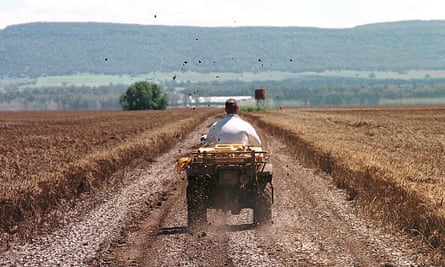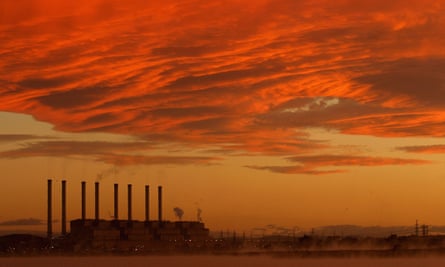If, as the environment movement contends, fossil fuels are the new tobacco, then Australia has cast itself as a sort of swaggering Marlboro man, puffing away contentedly as the rest of the world looks on quizzically.
As other countries look to transition to low-carbon alternatives with one eye on crunch climate talks in Paris later this year, Australia is pushing ahead with an expansion in coal extraction that its conservative prime minister Tony Abbott insists is “good for humanity”.
A series of huge mines planned for outback Queensland would, at capacity, produce nearly enough coal to match Germany’s total greenhouse gas emissions.
The federal government has just approved another mine, further south, on the fertile farming plains of New South Wales. It will be allowed to operate until 2046, a full 26 years after the point when the Intergovernmental Panel on Climate Change suggests the world should stop emissions rising to avoid disastrous global warming.
The mine, to be operated by Chinese state-owned firm Shenhua, has caused consternation among farmers, with agriculture minister Barnaby Joyce rebelling against his own cabinet colleagues by branding the approval “absolute madness” and “dopey”.

Both mines will liberate coal to further escalate Australia’s huge export industry, predominantly to India and China. The government’s rationale is clear – coal is here to stay and there is a moral imperative to provide it to the world, ideally reigniting Australia’s fading mining boom in the process. Any contrary view, such as the Pope’s, has been branded “unchristian” in the Abbott-friendly, Rupert Murdoch-owned press.
“For the foreseeable future coal is the foundation of prosperity,” Abbott said late last year. “Coal is the foundation of the way we live because you can’t have a modern lifestyle without energy, you can’t have a modern economy without energy.
“So if we are serious about raising people’s living standards in less developed countries, if we are serious about maintaining and improving living standards in countries like Australia, we have to be serious about making the best use of coal.”
Australia’s own energy supply is still resolutely wedded to fossil fuels, with brown coal generators in the southern state of Victoria among the most polluting power plants in the world. Australia, with one of the highest rate of emissions per capita in the world, has all the natural resources to transition to solar and wind energy, only for political ructions to regularly hamstring the renewable energy industry.
Abbott recently branded wind farms “visually awful” and has backed a parliamentary inquiry into their potential impact on health, despite numerous studies finding no evidence for such a link. Australia’s renewable energy target has been slashed by nearly a quarter – Abbott has said he regrets the cut wasn’t deeper – while the country’s “green” bank has been instructed to stop investing in wind and small-scale solar. The government would have scrapped the bank had it not been blocked by the upper house of parliament.
“The last two years has been the most frustrating in my 21-year career in renewables,” says Tobi Geiger, managing director of WestWind, which has plans to build 171 new wind turbines in Victoria. “I’ve never seen anything as bad as this, nothing as evil in terms of policymaking.
“When you compare things with Germany, you’d have to say Australia is so out of step. Germany has a conservative government but they stick to the growth of renewables. I have to say this period of my life has made me the least proud I’ve ever been to be Australian.” Geiger moved to Australia from Germany in 1999.
In one of its first acts after gaining power in September 2013, Abbott’s Coalition government scrapped the Climate Council, which provided information on climate change to the public. Australia then became the first nation to repeal a price on carbon, the culmination of Abbott’s vociferous and successful political strategy of playing on fears of a rise in household electricity prices.

Australia’s insistence on locking itself into fossil fuels while distancing itself from ambitious efforts to combat climate change has not gone unnoticed overseas.
British prime minister David Cameron, who put his name to a bipartisan commitment to phase out coal shortly before the UK election, has called Australia a “back marker” on climate change negotiations. In June, Kofi Annan, the former UN secretary general, criticised Australia for being a “free rider”, bemoaning the influence of the country’s powerful mining lobbyists. Aside from Canadian prime minister Stephen Harper, Abbott has few allies internationally on the issue.
But Abbott’s stance on energy and climate change sits comfortably with Australian conservative politics. His top business adviser can say the UN’s climate body is intent on a “new world order” and his backbenchers can label green groups “terrorists” or call for an inquiry into climate science and there is no internal fallout. Climate scepticism and an instinctive support for fossil fuels run deep in the Coalition, if not universally.
“All thinking Australians are supporters of mining, the wealth it has brought us is obvious,” Coalition senator Ian Macdonald tells the Guardian. Macdonald made headlines last year when he addressed parliament wearing a high-visibility mining uniform.
“There’s no doubt that coal-fired energy will be here for a long, long time. It’s the cheapest form of energy and will bring third world nations out of poverty. The opposition to mining is usually from those in comfortable fixed-income positions who have a very nice life working for a government or some organisation.
“I believe the climate is changing but I’m yet to be convinced that man’s emissions of carbon is the cause. You are treated like a heretic for saying that, but a lot of respected scientists understand that. They aren’t given much of a say on [public broadcaster] the ABC, or, could I say, the Guardian.”
Abbott himself has previously said the science of climate change is “crap” and raised doubts over humans’ contribution to global warming in his 2009 book Battlelines.
This rhetoric has been dropped since he gained power and he now accepts that climate change is a problem worth tackling, provided it doesn’t “clobber jobs”.
Climate scepticism has been phased out in favour of full-throated support for fossil fuels, often to extraordinary lengths. Last year, Abbott castigated the Australian National University for making the “stupid decision” to divest itself of fossil fuel stocks.

Those who know him say the prime minister is an intelligent, often witty man, prone to deep reflection. But in public he has forged a reputation as a political pugilist, adept at identifying points of division in order to pummel them relentlessly.
A committed Catholic, Abbott has indicated that he views the world’s resources as being in the gift of humans to use to forge a better world. Rather than seeing it as immoral to burn fossil fuels and imperil the world’s poor with climate change, the moral good is in providing them with the raw materials to combat poverty.
In a speech to forestry workers last year, during an unprecedented, and ultimately failed, bid to strip World Heritage protection from tracts of Tasmania’s forests, Abbott said: “I salute you as people who love the natural world, as people who love what Mother Nature gives us and who want to husband it for the long-term best interests of humanity.”
His uncompromising stance on climate change, as well as on asylum seekers, gay marriage and the ABC, has enraged the political left in Australia.
“He’s a poor man’s George W Bush, really,” says former Australian Greens leader Bob Brown.
“The absurdity of it all is a bit toe-curling for Australians holding intelligent conversations with people from abroad. The world is pouring unprecedented amounts of money into renewable energy and yet we have the only notable leader in the world saying wind farms are ugly and need to be held back.”
Brown held fruitless negotiations with Abbott following the hung parliament that resulted from the 2010 election, with the Greens eventually backing the incumbent Labor government.
“I walked into his office and his feet were on the table, the soles pointing at me,” Brown says. “I don’t know if it was deliberately rude but [former Coalition prime minister] John Howard wouldn’t do something like that, he’d offer a cup of tea or something.
“Abbott demonstrated to me that he not only doesn’t he get it with climate change but that he has nothing to offer. John Howard was a skilled politician and strategist while Tony Abbott is just an awkward doctrinaire. He can’t relate to people or issues that don’t come within his life experience.”
There is no doubt that the mining industry has been good for Australia in the past 10 to 15 years. More than any other industry, mining powered the growth of Australia’s GDP in that period. Largely this was the result of the good fortune of iron ore prices soaring from US$31 a tonne in 2003 to US$195 in 2007, which drove massive investment.
During this boom period for the steel-making ingredient, the coal sector was relatively unaffected – barely growing in importance to the Australian economy. While the iron ore sector went from representing 1.1% of GDP to its current share of 3.9%, the coal industry went from 1.1% of GDP to now representing about 1.4%.
But as iron ore and coal prices have fallen since 2011 so have investment and jobs in the industry. Despite being a significant source of economic growth, mining has never been a major employer. During 2012, at its peak, it employed 2.4% of all Australian workers; now it employs just 1.9% – fewer than the arts and recreation industry.
For the future the main source of economic growth from mining will come via exports. In the 12 months to March, Australia’s exports grew by 8.6% – the fastest growth since 2000. Iron ore is a much larger export than coal, but coal is still important.
However, that importance has declined from 20% of all goods exported in 2009 to about 15%. And with continuing weak demand from China and an over-supply of coal around the world, that decline, at least in the short term, looks set to continue.
With China looking to restrict its overseas coal imports and curb its own emissions to ensure its citizens have breathable air, continued reliance on mineral exports may not be Australia’s best economic strategy.
Politically, too, the approach could prove difficult for Abbott. Even faced with a lacklustre Labor opposition, the Coalition has trailed in the opinion polls for most of Abbott’s tenure and there are signs the public is not fully on board with the fossil fuel-tinged policymaking.
According to recent polling by the Lowy Institute, 50% of Australians agree that “global warming is a serious and pressing problem” – up 14% since 2012. Asked what Australia’s primary energy source should be in 10 years, 43% of respondents cited solar power. Coal was selected by only 17%.
But it is doubtful whether Abbott will be swayed, either by scientific or economic evidence or, despite his undoubted ability as a political survivor, poor polling.
As he wrote in his book Battlelines: “To a conservative, intuition is as important as reasoning; instinct as important as intellect. A way of life has far more demonstrative power to a conservative than a brilliant argument.”

Comments (…)
Sign in or create your Guardian account to join the discussion